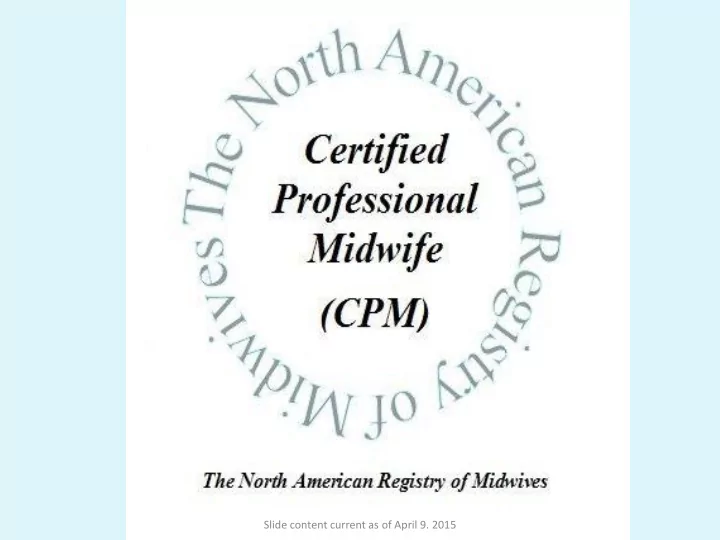

Slide content current as of April 9. 2015
Legal Status- the complexities 28 States have a route to legal recognition that requires all or part of the CPM process to verify education, training, and supervised experience. All of these Licensed States use the NARM Exam as the Licensure Exam States with licensure programs that preceded the CPM may still use a state agency process to verify education and supervised experience, followed by the NARM Exam. States that created licensure after 1995 require the CPM credential as verification of education and supervised experience; but new trend toward formal education Current as of April 9. 2015
Pioneers of Legal Recognition States with paths to licensure comparable to the CPM, all using the NARM Exam Alaska (apprenticeship and NARM exam) California (school or challenge, and NARM exam) Florida (school and NARM exam) Montana (apprenticeship and NARM exam) New Jersey (school and NARM exam) Washington (school or challenge, and NARM exam) Missouri and Maine require the CPM for legal practice but do not have licensure or regulation Current as of April 9. 2015
MODERN MODELS OF LEGAL RECOGNITION States that require the full CPM credential for licensure Arkansas* Oregon Arizona* South Carolina* Colorado * Tennessee Delaware Texas* Idaho Vermont Indiana** Utah Louisiana* Virginia Minnesota Wisconsin New Hampshire Wyoming New Mexico* * Indicates state based apprenticeship licensure prior to CPM Current as of April 9. 2015
Regulatory Agencies Departments of Health: Arkansas, Arizona, Delaware, Florida, New Hampshire, New Mexico, Rhode Island, South Carolina, Tennessee, Texas, Washington Departments of Professional Regulation: Colorado, Idaho, Oregon, Utah, Wisconsin, Wyoming, Vermont Boards of Medicine: California, Indiana, Louisiana, Minnesota, New Jersey, Virginia Department of Commerce: Alaska Board Of Alternative Healthcare : Montana Current as of April 9. 2015
Odd Differences in Regulations 25 of the 28 states allow midwives to carry and administer specific medications. Only Arkansas and Virginia specifically prohibit medications, and Missouri is permitted but not licensed so there is no authority to write regs to allow medications VBAC is specifically prohibited in three states (Arkansas, Alaska, and South Carolina), but proposed bills in Maryland and Delaware intend to prohibit them. Florida, Texas, and Utah require consultation for VBAC, which may be accessible or may not. Current as of April 9. 2015
Odd Differences in Regulations Oregon, Tennessee, Washington, and Virginia do not prohibit breeches and twins, but can still be problematic. For example, Washington rules say midwives must consult for high risk births, but they don’t define which ones are high risk. MN regulations are very vague about what is allowed and what is not. Licensure is voluntary in Oregon, Utah, and Minnesota (required for use of meds). Arkansas and Louisiana require each client to see a physician twice. Wyoming requires applicants for licensure to have graduated from a MEAC- accredited school, OR to have been licensed in another state for 5 years. Current as of April 9. 2015
Odd Differences in Regulations Only one state appears to allow midwives to provide well-woman care (New Mexico). Other states define midwifery care as being in the prenatal, intrapartum, and postpartum periods Two of the non-voluntary states have exemptions for licensure: Alaska allows indigenous midwives to be exempt from licensure if their community has a culture of traditional midwifery going back at least two generations. Washington has a religious exemption to protect home birth as the practice of religion if the treatment is by prayer. Colorado allows the use of medications, but does not allow suturing (nor meds for suturing). Florida allows CEU credit (towards renewal of license) for providing pro-bono services in underserved areas. Current as of April 9. 2015
Legislative Proposals in 2015 Seven states have proposals for new licensure that were/are active this year: Maryland and Delaware have bills that are making strong headway towards passage. North Carolina has submitted two bills (decrim and licensure). Massachusetts has a bill but it is moving very slowly (two year session). Michigan intends to submit a bill, but the session is long and they are in no hurry. West Virginia submitted a decrim bill that has already been defeated. Illinois had a bill submitted by a previous sponsor but the consumer group is burned out and they are letting it die. Current as of April 9. 2015
Legislative Proposals in 2015 These states have a current, legal process but are working to revise those statutes: Missouri has legal status without licensure; They have a licensure bill in process, there is another licensure bill supported by the medical lobby which would place licensure in their control; there is another bill to require malpractice insurance. Maine has legal status without licensure, and they hope to have a licensure bill going through this year. Minnesota has licensure under the Board of Medicine, and they are trying to move the licensure program somewhere else, such as the Dept of Health. Indiana submitted a bill to revise their existing law, but it didn’t pass. Current as of April 9. 2015
Contact Information If you have new or updated information about a state, please let me know. Feel free to contact me at any time with questions. Ida Darragh testing@narm.org 501-296-9769 Current as of April 9. 2015
Recommend
More recommend